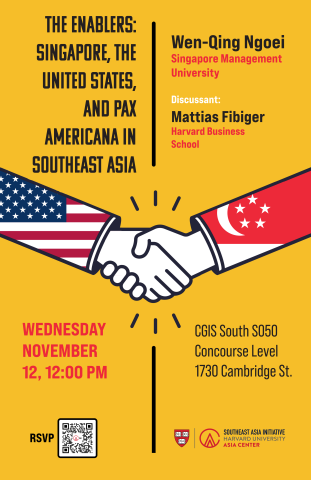The Enablers: Singapore, the United States, and Pax Americana in Southeast Asia

Wen-Qing Ngoei, Associate Professor of History at the Singapore Management University
Discussant: Mattias Fibiger, Harvard Business School
Registration appreciated, but not required.
From the late Cold War into the present, Singapore and the United States have collaborated to preserve and elaborate U.S. hegemony in Southeast Asia. American forces have since 1990 enjoyed enhanced access to Singapore’s military installations, enabling the U.S. to project its power into the South China Sea and the Indian Ocean. The United States’ permanent military presence in Singapore, including 15 different military commands, is the largest in Asia south of Japan. U.S. foreign direct investment in Singapore is exceptional, more than what America puts into China, India, and South Korea combined; approximately nine times greater than what China invests in Singapore. Many experts insist on calling Singapore neutral and/or nonaligned, claiming that the city-state is “hedging” between Washington and Beijing. Yet, Singapore’s leaders have hailed the economic and security benefits of U.S. predominance in Asia, often used the terms Pax Americana and the so-called “rules-based order” interchangeably to describe this state of affairs, and encouraged China to uphold the status quo instead of disrupting it. This talk discusses the intimate relationship between the Southeast Asian city-state and its choice superpower, the United States, how they enabled each other in politico-military and economic terms, and what ramifications, strategic as well as cultural, this has had for Singaporeans and U.S. empire in Southeast Asia.
Bio:
Wen-Qing Ngoei is Associate Professor of History at the Singapore Management University, where he currently serves as Associate Dean (Partnerships and Engagement). He completed his PhD in the history of U.S.-Southeast Asian relations at Northwestern University and published his first book, Arc of Containment: Britain, the United States, and Anticommunism in Southeast Asia (Cornell UP), in 2019. His essays on the domino theory, British decolonization in Southeast Asia, and U.S. empire have appeared in Diplomatic History, Journal of American East Asian Relations, and volumes like the Cambridge History of the Vietnam War. His current book project examines the strategic and cultural dimensions of Singapore-U.S. relations from the late 1970s to the present.



